Books/Chapters by Stavros Drakoularakos

From Pluralism to Extinction? Perspectives and Challenges for Christians in the Middle East Edited by Sotiris Roussos, 2023
Christian communities in the Middle East have drawn a great deal of attention, given their precar... more Christian communities in the Middle East have drawn a great deal of attention, given their precarious status amidst the violent wind that came along with the Arab uprisings that swept the region in the post-2011 era. Even though there is no doubt that they were all affected, each Christian community has its own context within the nation-state it belongs to and, by extension, the angst of the post-2011 dynamics has different implications for each one. In order to better understand these implications, this paper will employ Ontological Security Theory (OST), which provides conceptual tools with which state identity and foundational narratives are cultivated vis-à-vis the Christian community in Egypt and Lebanon. The dialectic relation between state and religious communities allows us to explore in-depth how Christian communities are impacted by political and/or societal changes as well as the extent to which they may drive or inhibit particular state identity formation in times of crisis.

From Pluralism to Extinction? Perspectives and Challenges for Christians in the Middle East Edited by Sotiris Roussos, 2023
The slogan “property of the Islamic State” was found graffitied on walls of houses, buildings and... more The slogan “property of the Islamic State” was found graffitied on walls of houses, buildings and farms wherever and whenever Daesh forces successfully captured a city or village in Iraq and Syria. The exodus of Christians from those regions during the decade of the 2010s, and especially throughout the times of the rise and fall of the Islamic State, is estimated to amount to approximately at least one million people. The factors behind the mass exodus are chiefly located in the atrocities committed by Islamic State fighters, in addition to the wider ramifications of the various and ongoing infighting in the Syrian and Iraqi states, ever since the 2010 Arab uprisings and the 2003 Gulf war, respectively. Both Syria and Iraq host a large part of Middle Eastern Christianity followers and have been subject to numerous studies with regard to the co-optation policies between Church and state during the previous decades. However, the impact of the state-building and identity homogenisation processes of the Islamic State on the Christian communities themselves have been mainly confined within the larger examination of international and regional geopolitical antagonisms, the Sunni-Shia sectarian tensions, Kurdish state-building and irredentism, or the impact and aftermath of the Arab uprisings. Instead, this chapter opts for a focused lens on the Christian communities' life shifts and limited options, both during the rise and initial establishment of the Islamic State, as well as following its eventual collapse.
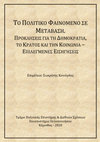
ΤΟ ΠΟΛΙΤΙΚΟ ΦΑΙΝΟΜΕΝΟ ΣΕ ΜΕΤΑΒΑΣΗ. ΠΡΟΚΛΗΣΕΙΣ ΓΙΑ ΤΗ ΔΗΜΟΚΡΑΤΙΑ, ΤΟ ΚΡΑΤΟΣ ΚΑΙ ΤΗΝ ΚΟΙΝΩΝΙΑ − ΕΠΙΛΕΓΜΕΝΕΣ ΕΙΣΗΓΗΣΕΙΣ, Feb 1, 2020
Οι Κόπτες της Αιγύπτου αποτελούν τη μεγαλύτερη πληθυσμιακά χριστιανική κοινότητα στην περιοχή της... more Οι Κόπτες της Αιγύπτου αποτελούν τη μεγαλύτερη πληθυσμιακά χριστιανική κοινότητα στην περιοχή της Μέσης Ανατολής και του Μαγκρέμπ. Η εγκατάσταση του Προέδρου Αλ-Σίσι στην εξουσία συνοδεύτηκε από την άμεση στήριξη της θρησκευτικής και πολιτικής τους ηγεσίας, όπως αυτή εκπροσωπείται από τον Πάπα της Κοπτικής Εκκλησίας της Αιγύπτου Θεόδωρο Β’. Τα αίτια που οδήγησαν στην στήριξη του Προέδρου Αλ-Σίσι εντοπίζονται στην προηγούμενη κυβέρνηση της Μουσουλμανικής Αδελφότητας, κατά τη διάρκεια της οποίας ο βίος του κοπτικού πληθυσμού είχε υποβαθμιστεί σημαντικά, στα ζητήματα κοινωνικής συνύπαρξης με τον μουσουλμανικό πληθυσμό, καθώς και σε θέματα αναφορικά με την στοχοποίηση της χριστιανικής κοπτικής κοινότητας από τρομοκρατικούς παράγοντες. Τίθεται το ερώτημα του κατά πόσο τα ληφθέντα μέτρα της αιγυπτιακής ηγεσίας έχουν τη δυνατότητα να συμβάλλουν ουσιαστικά και σε βάθος χρόνου στην καταπολέμηση του κοινωνικού διχασμού μεταξύ των Κοπτών και των Σουνιτών, καθώς και στην προστασία της κοπτικής κοινότητας από εξωγενείς τρομοκρατικούς παράγοντες.
Οι σχέσεις μεταξύ του Ισραήλ και της Τουρκίας έχουν διαδραματίσει καθοριστικό ρόλο στη διαμόρφωση... more Οι σχέσεις μεταξύ του Ισραήλ και της Τουρκίας έχουν διαδραματίσει καθοριστικό ρόλο στη διαμόρφωση της εξωτερικής πολιτικής των δύο χωρών τις τελευταίες τρεις δεκαετίες, αρχικά με την προώθηση μιας στενότερης συνεργασίας στο οικονομικό, και στη συνέχεια στο στρατηγικό και στρατιωτικό πεδίο με τη σύναψη διαδοχικών συμφωνιών, οι οποίες χαρακτηρίστηκαν – από τρίτα μέρη αλλά όχι από τους ίδιους – με τον όρο της συμμαχίας. Οι παράγοντες που επηρέασαν την ισραηλινο-τουρκική προσέγγιση της περιόδου του 1990 εμφανίζονται με τη διαμόρφωση ενός νέου διεθνούς πλαισίου μετά το τέλος του Ψυχρού Πολέμου και την ανάδειξη των ΗΠΑ ως μοναδικής παγκόσμιας υπερδύναμης. Η νέα κατάσταση πραγμάτων κατέστησε επιτακτική την επανεξέταση των ζωτικών συμφερόντων και προτεραιοτήτων του Ισραήλ και της Τουρκίας, ενόψει της υποβάθμισης της στρατηγικής τους σημασίας στον ευρύτερο γεωπολιτικό τους χώρο.
Papers by Stavros Drakoularakos
Centre for Mediterranean Middle East and Islamic Studies, 2024
The phrase “murderer Israel; collaborator AKP” was part of Hasan Bitmez’s final speech at the Tur... more The phrase “murderer Israel; collaborator AKP” was part of Hasan Bitmez’s final speech at the Turkish parliament on December 14, 2023. The words of the late MP and one of the leaders of the 2023 opposition parties’ bloc soon became the rallying cry at demonstrations for Palestine and against Erdogan’s government. This article will focus on the Turkish President’s stance towards Israel with regard to Ankara’s shifting domestic and foreign policy priorities and in contrast to the political and popular sentiment towards the Palestinian cause and the Gaza war.
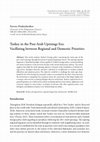
Polish Political Science Yearbook, Apr 28, 2024
This article analyses Turkey's foreign policy concerning the status quo of the post-Arab uprising... more This article analyses Turkey's foreign policy concerning the status quo of the post-Arab uprisings through the prism of regional hegemony theory. The aspiring regional hegemon is identified through criteria applied to Turkish foreign policy, recontextualizing soft power initiatives of the previous decades with current hard power policies. The article suggests that while the Arab uprisings played a vital part in the redefinition of Turkish foreign policy, Erdoğan's domestic priorities informed its recalibration to weather political difficulties and maintain power. The objective would be to challenge the status quo shepherded by the West during the twentieth century as articulated by the Mavi Vatan doctrine, the motivation to renegotiate the Lausanne treaty, the conversion of the Hagia Sophia into a mosque, and even the escalating Erdoğan-Macron verbal feud. Turkey's aspirations for regional hegemony are evidenced in policies including military intervention, diplomatic and economic support to state entities, escalation of tensions with other regional powers, and Erdoğan's consolidation of power over Turkish domestic affairs.
Centre for Mediterranean Middle East and Islamic Studies, 2023
The Iraq war of 2003 occurred at a period of time when the United States were at the height of it... more The Iraq war of 2003 occurred at a period of time when the United States were at the height of its power and clout in the international system. The fall of the Soviet Union and the end of the Cold War in 1990-1991 heralded the birth of a unipolar international order based on the strengths and values of the American hegemon. Nonetheless, world history is punctuated with instances of international power equilibria rising, shifting, and restructuring anew. It certainly seems that Washington’s Iraqi intervention will be considered as the force motrice, which eventually gave way to power reshuffling in the international order and the end of the unipolar system.

Studies in World Christianity, 2022
After the eruption of civil strife in Syria and Iraq, widespread violence and harassment, mainly ... more After the eruption of civil strife in Syria and Iraq, widespread violence and harassment, mainly by jihadist groups, came to substantiate fears for the extinction of the Christians. Various jihadist groups have perpetrated an ongoing ethnic cleansing of Christians. The paper will examine another alternative to co-optation, a survival strategy that has developed among the Christians in Iraq and Syria, that of armed resistance and the organisation of militias. This militarisation trend reveals serious inner-communal disagreements. Caught among regional antagonisms and suspicious of the ascendent Sunni, Shia and Kurdish political aspirations and nationalisms, the idea of self-determination and self-government in an autonomous zone around Nineveh seems the best alternative to state co-optation. The paper will also look into the evolving relationship of the Christian communities with the state, the Muslim majorities, the other non-Muslim communities and the international community in a system of overlapping authority and multiple loyalty in the region.
Centre for Mediterranean Middle East and Islamic Studies, 2022
The developments following the 2011 Arab uprisings prompted the Gulf countries to re-evaluate the... more The developments following the 2011 Arab uprisings prompted the Gulf countries to re-evaluate their relationships with countries in varying degrees of turmoil such as Syria, Libya, Iraq and Egypt. However, the Gulf does not always present a unified front in terms of foreign policy. The United Arab Emirates (UAE) and Saudi Arabia are sometimes independently spearheading initiatives, while regional priorities and economic engagements diverge according to their antagonism with Iran and the ever-fluctuating regional presence of the US.
Centre for Mediterranean Middle East and Islamic Studies, 2022
For the better part of 2021, Turkey has been striving to make waves by presenting itself as an ac... more For the better part of 2021, Turkey has been striving to make waves by presenting itself as an actor able to assert its interests in Afghanistan following the NATO forces hasty exodus. The aim of this article is to articulate the driving factors behind Turkish foreign policy with regards to a Taliban-led Afghanistan, as well as to analyse its shortcomings in light of the domestic Taliban priorities and in flux regional developments.
The Jean Monnet Papers on Political Economy, May 24, 2021
This paper aims to bridge the gap between the pausing of the Turkish European integration process... more This paper aims to bridge the gap between the pausing of the Turkish European integration process and the gradual inflection of Ankara’s foreign policy to the Middle Eastern region through the prism of ontological security theory. The objectives are threefold: first, to present and illustrate ontological security theory as applied to state entities; second, to examine the Turkish European integration process through the tenets of the Kemalist foundational identity narrative; and third, to focus on the build-up and identity redefinition in the 2000s and 2010s in order to better comprehend the emphasis shift from the European Union to the Middle East.
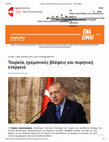
ENA Institute for Alternative Policies, Jan 14, 2021
Κατά τη διάρκεια της προηγούμενης δεκαετίας παρατηρήθηκε μια έμφαση στη ρητορική τόσο της εσωτερι... more Κατά τη διάρκεια της προηγούμενης δεκαετίας παρατηρήθηκε μια έμφαση στη ρητορική τόσο της εσωτερικής όσο και της εξωτερικής πολιτικής της Τουρκίας ως προς το δικαίωμα απόκτησης πυρηνικού οπλοστασίου. Γεγονός είναι πως κατά τη διάρκεια του 20ού αιώνα, η Τουρκία είχε υπογράψει σχετικές συμβάσεις-όπως τη Συνθήκη για τη Μη Διάδοση των Πυρηνικών Όπλων-, με τις οποίες συναινούσε τόσο στον περιορισμό της εξάπλωσης της πυρηνικής τεχνολογίας για πολεμικούς σκοπούς όσο και στην αποφυγή ανάπτυξης πυρηνικού προγράμματος. Τα ανωτέρω φυσικά δεν αφορούν στις προσπάθειες ανάπτυξης της ατομικής τεχνολογίας και τεχνογνωσίας για ειρηνικά ενεργειακά οφέλη. Παρά ταύτα, η παράνομη διάχυση της ατομικής τεχνογνωσίας και η δημιουργία υποδομών πυρηνικού οπλοστασίου σε άλλα κράτη τις προηγούμενες δεκαετίες συντέλεσαν στην υποβάθμιση των σκοπών αλλά και της συμβολικής σημασίας των προαναφερθεισών Συνθηκών. Η νέα τάξη πραγμάτων η οποία διαμορφώθηκε στην
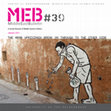
Centre for Mediterranean, Middle East and Islamic Studies, Jan 13, 2021
On the eve of the ten-year anniversary of the Arab Uprisings of 2011, CEMMIS has opted to commemo... more On the eve of the ten-year anniversary of the Arab Uprisings of 2011, CEMMIS has opted to commemorate the event via a series of analyses focused on the repercussions and developments related to Middle Eastern countries during the previous decade. One should note that the CEMMIS Middle East Bulletin 39 is titled The Arab uprisings: Break on through to the other side for several reasons. The first is that it is a very catchy title and references to a song which – as the Arab uprisings – influenced an entire generation. The second is that the purpose of the Bulletin is to shine a light on the countries, as well as on the people directly affected by the Arab uprisings but were nonetheless subjected to their aftereffects. The third reason is that although the Arab Spring is commonly associated with the countries which saw their regimes toppled, its repercussions influenced and still drive policies and social movements throughout the Middle East and beyond. As a result, the current issue will abstain from examining Tunisia, Egypt, Libya or Syria, as these countries bore the immediate brunt of the Arab Spring developments, for better or for worse.
Digest of Middle East Studies, Feb 2, 2021
In this article, I analyze the rise of the “Lausanne Syndrome” in Turkish politics during the twe... more In this article, I analyze the rise of the “Lausanne Syndrome” in Turkish politics during the twenty‐first century through the prism of ontological security theory. The arguments are presented through the examination of the legacy of the “Sèvres Syndrome”, the impact of the Turkish‐Israeli diplomatic break‐up during the 2010s on the Turkish self‐narrative, and the declaration of the second war of independence following the failed coup attempt of 2016. The “Lausanne Syndrome” serves both as a domestic and foreign policy tool, as it relates to Erdoğan’s search for ontological security and geopolitical strategy.
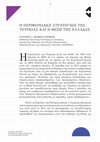
Ινστιτούτο Εναλλακτικών Πολιτικών, 2020
Η στρατηγική της Τουρκίας μετά την άνοδο του AKP στην εξουσία το 2002 σε ό,τι αφορά την περιοχή τ... more Η στρατηγική της Τουρκίας μετά την άνοδο του AKP στην εξουσία το 2002 σε ό,τι αφορά την περιοχή της Μέσης Ανατολής αλλά και τις σχέσεις με την Ευρωπαϊκή Ένωση και τις ΗΠΑ δύναται να διακριθεί σε δύο φάσεις: πριν από και μετά την «Αραβική Άνοιξη». Η περίοδος έως το 2011 μπορεί να χαρακτηριστεί ως εποχή κατά τη διάρκεια της οποίας οι κυβερνήσεις του Ερντογάν, από τη μία πλευρά, προσέγγιζαν την Ευρωπαϊκή Ένωση με στόχο την εξασφάλιση της βιωσιμότητάς τους έναντι των κεμαλικών ιθυνόντων και προς αποφυγή επανάληψης των στρατιωτικών πραξικοπημάτων των προηγούμενων δεκαετιών. Από την άλλη πλευρά, προωθήθηκε μια προσπάθεια προσέγγισης με τη Μέση Ανατολή και την ανάδειξη της Τουρκίας ως κράτους-μοντέλου και παραδείγματος προς μίμηση. Ήταν η περίοδος της ρήσης των «μηδενικών προβλημάτων» με τα γειτονικά κράτη, του τότε Υπουργού Εξωτερικών Νταβούτογλου, η οποία χιουμοριστικά μετονομάστηκε από αναλυτές ως περίοδος «μόνο προβλημάτων». Κατά τη διάρκεια της δεύτερης φάσης, η τουρκική εξωτερική πολιτική αναγκάστηκε να ενσωματώσει τις συνέπειες των εξεγέρσεων των ετών μετά το 2011 και να προσαρμόσει τις κατευθυντήριες γραμμές της βάσει των συνεχώς νέων εξελισσόμενων δεδομένων. Η προσπάθεια των προηγούμενων ετών για ανάληψη της θέσης της
Centre for Mediterranean, Middle East and Islamic Studies, Jun 6, 2020
Although Iran is generally perceived as a uniformly Shi’a Persian country, the reality on the gro... more Although Iran is generally perceived as a uniformly Shi’a Persian country, the reality on the ground is quite different. Iran is home to a number of minorities of diverse ethnic and religious backgrounds, whose status is often forgotten. Hence, examining these minorities’ status in modern day Iran and contrasting it with recent socio-political developments will yield an updated assessment of current and pressing Iranian domestic affairs
Ινστιτούτο Εναλλακτικών Πολιτικών, 2020
Σε μια χρονική περίοδο όπου επιτάσσεται η μεταβολή της ισορροπίας μεταξύ τομέων όπως της εξωτερικ... more Σε μια χρονική περίοδο όπου επιτάσσεται η μεταβολή της ισορροπίας μεταξύ τομέων όπως της εξωτερικής πολιτικής και της διατήρησης της ομαλής λειτουργίας του εθνικού συστήματος υγείας, κρίνεται απαραίτητη μια νέα ανάγνωση και ενσωμάτωση των δεδομένων που προκύπτουν από τις τρέχουσες συνθήκες, τόσο στο εσωτερικό όσο και στο εξωτερικό.
Centre for Mediterranean, Middle East and Islamic Studies, Mar 16, 2020
During the past few weeks, it seems that the killing of General Qasem Soleimani, the head of the ... more During the past few weeks, it seems that the killing of General Qasem Soleimani, the head of the Islamic Revolutionary Guard Corps (IRGC), on January 3, 2020, should have sent Middle Eastern relations and the fragile regional equilibrium into a spiral. Nonetheless, the repercussions of the US administration's decision have not yet been observed on a larger international scale, but rather on the domestic one.
Centre for Mediterranean, Middle East and Islamic Studies, Jan 11, 2020
The failed military coup of 2016 has had a number of ramifications both on the domestic, as well ... more The failed military coup of 2016 has had a number of ramifications both on the domestic, as well as on the foreign affairs of Turkey. Although the most publicized ones are the aftereffect on the military, the crackdown on dissidents and the downfall of the relationship with the Gülen Movement, it is of note that the entire coup affair has led to the declaration of a second war of independence during 2019, akin to the one during 1919-1923 which eventually gave way to the creation of the modern Turkish State. This analysis focuses on the similarities between the two wars, as well as their differences, and, especially, in regard to their endgame.
Centre for Mediterranean, Middle East and Islamic Studies, Jun 19, 2019
Particularly since the military coup of 2013 by current President Abdel-Fattah al-Sisi and the ou... more Particularly since the military coup of 2013 by current President Abdel-Fattah al-Sisi and the ouster of the Muslim Brotherhood from power, the Egyptian state has made efforts to promote the values of peaceful
religious coexistence. Various state initiatives as well as the work of the al-Azhar University were heavily publicized abroad and strove to convey messages of unity and religious moderation, regarding both the living conditions of religions communities in the country and the rising influence of radical elements in the fringes of society, respectively. Nonetheless, it remains to be seen whether these initiatives originate from a place of genuine will for political and societal change, and if their implementation lacks the necessary political momentum to drive them forward.



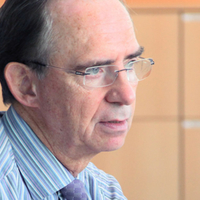
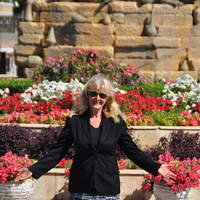
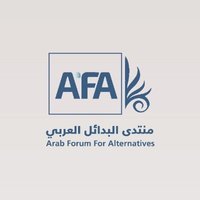





Uploads
Books/Chapters by Stavros Drakoularakos
Papers by Stavros Drakoularakos
religious coexistence. Various state initiatives as well as the work of the al-Azhar University were heavily publicized abroad and strove to convey messages of unity and religious moderation, regarding both the living conditions of religions communities in the country and the rising influence of radical elements in the fringes of society, respectively. Nonetheless, it remains to be seen whether these initiatives originate from a place of genuine will for political and societal change, and if their implementation lacks the necessary political momentum to drive them forward.
religious coexistence. Various state initiatives as well as the work of the al-Azhar University were heavily publicized abroad and strove to convey messages of unity and religious moderation, regarding both the living conditions of religions communities in the country and the rising influence of radical elements in the fringes of society, respectively. Nonetheless, it remains to be seen whether these initiatives originate from a place of genuine will for political and societal change, and if their implementation lacks the necessary political momentum to drive them forward.